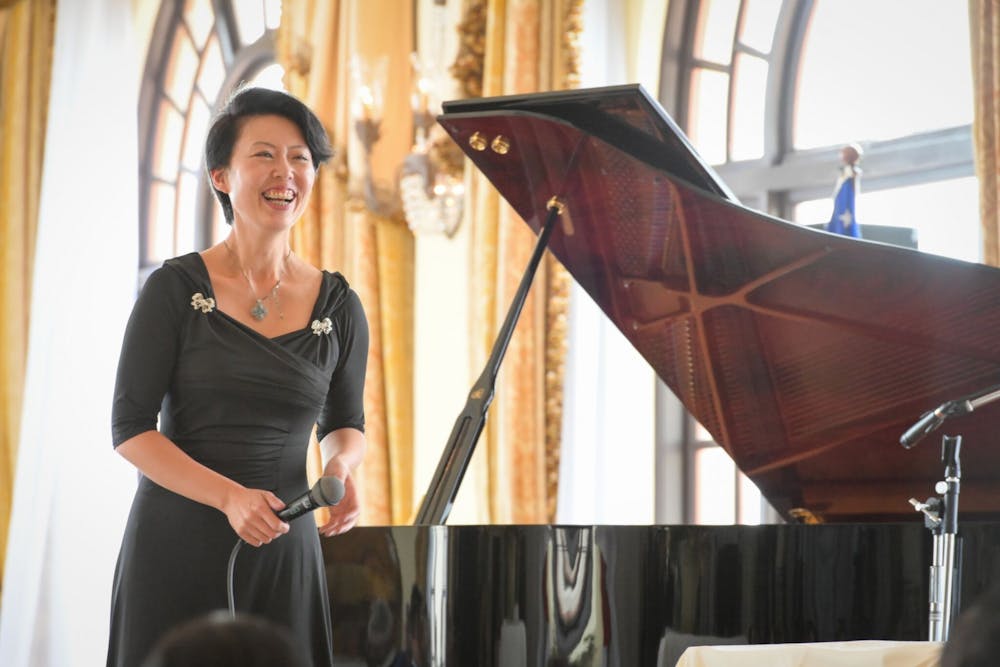Let’s reevaluate music as a social resource

Since COVID-19, from my new home in California, I found myself reading the news from Rice more eagerly, thinking back to the seven years I spent there with many life-changing encounters. As the pandemic highlights many of the challenges we face today, from social inequity to climate change to political division, I crave the late-night Valhalla discussions and the small talk waiting in line at Coffeehouse. It is with this nostalgia, and the urge to share my own source of encouragement, that I am writing to my beloved and sorely missed community at Rice.
I say music can heal our divided nation. You may laugh but hear me out.
I am an international pianist and a recording artist. After over a decade of concertizing, I felt the urge to test the validity of music as a universal language, so I came to Rice intending to study music from an academic lens. I earned my Doctor of Musical Arts degree from the Shepherd School of Music in 2017.
While at Rice, I started working with researchers from Houston Methodist Hospital’s Center for Performing Arts Medicine to study how, how much and why music is essential to our well-being. My community at Rice and my research findings all helped me become the musician that I am today, with the underlying conviction in the power of music. Music is not a commodity or luxury — it is our humanity, as integral to our social and individual well-being as laughter, meals and exercise.
Last September, the National Institute of Health allocated 20 million dollars for research in neuroscience and music. After examining more than 3,000 studies worldwide, the World Health Organization endorsed music, and other arts, as effective in enhancing our well-being. Our individual health is affected by our relationships, the society that surrounds us, and how secure we feel about them. Music can help improve both.
Music synchronizes our heartbeats, breathing and brainwaves with others. As social animals, we find this vital. That is why every civilization we know of has had their own musical culture, now most popularly known by, for example, Daniel Levitin’s The World in Six Songs. Some even say that Neanderthals sang! Music is like a meal. Sharing it reminds us that what we share is greater than our differences. Our fate is entwined. We share our time and this globe.
We are designed to cohabitate. We are wired to instinctively recognize that our survival depends on our cooperation. Music strengthens our bonds. It helps produce oxytocin, the so-called love hormone, helping us recognize ourselves in others.
Music unites us, encouraging us to be more empathetic. Musical syntax reflects that same message of togetherness despite our differences. Let me give you an example. Think of your favorite song — any song. Now, think of that song as a series of tension and resolution. (Warning: A little music theory here!)
Did you know that soundwaves between certain notes are in perfect numerical ratios? It was Pythagoras who is said to have discovered this. The ratio between the middle A (A4=440 Hz) to another A an octave higher (A5=880 Hz) is 1:2. Their soundwaves never collide. The resulting synergy resonates the two notes in consonance, carrying the sound farther, and ringing longer. Dissonance, on the other hand, is a rapid collision of soundwaves. If you listen closely to A (440 Hz) and A# (466.1638 Hz), you can hear the two soundwaves colliding in fast beats: 440 vs. 446.1638.
On the surface, consonance feels right, and dissonance wrong. However, without dissonance, music becomes a stagnant resonance without development. This is one of the life lessons music syntax teaches us. What drives music forward is the opportunity for resolution that dissonance creates. Without any discord, there is no progress, or music.
Dissonance can be painful. It can sound like an outcry. It can be violent, or miserable: yearning and pleading, causing discomfort and anguish. But the more tension it creates, the more meaningful the resolution becomes.
To be sure, a poetic analogy between music and our differences will not resolve any issues directly. It can, however, remind us of our shared humanity. It can get us back in touch with our nature as social animals. It is a nature that is often oppressed by the individualism in our capitalistic society that encourages competition, putting too much focus on the dissonances for our own good.
Our favorite songs may be different, just as your preferred dish or politician. But the sentiments behind our songs are the same. We all eat, sing and envision a better future for our children. So, sing that favorite song of yours. Really lean into that dissonance and appreciate the resolution that follows. We are ready for a focus on our collective future. Music can help take us there. So, let us reevaluate music as a social resource.
Makiko Hirata is a pianist and alumna. She has performed throughout the Americas and Eurasia and has recorded ten albums. She attained her DMA, Doctor of Musical Arts, from the Shepherd School of Music in 2017.
More from The Rice Thresher
Rice University philosophy professor Tim Schroeder on textbook piracy
The question of the week asks, “Is it ethical to pirate textbooks for my college courses?”
Recent H&D decisions are eroding trust between students and administration
What you read below was intended to be presented at the Housing and Dining Town Hall on September 1, 2 to 4 p.m. Instead of presenting this, students patiently waited in the heavy downpour, expecting their voices to be heard, but a formal cancellation of the Town Hall was not issued until about half an hour afterward via Instagram.
Make Rice a tailgating school again
What seems to be the last Bayou Bucket Classic is in three days. Will students show up for the crosstown rivalry?


Please note All comments are eligible for publication by The Rice Thresher.